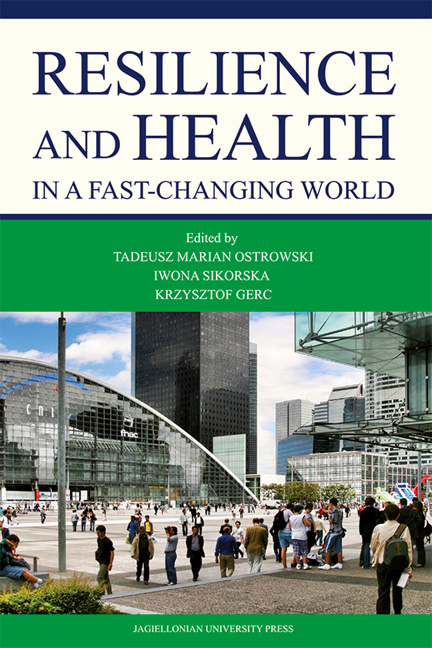Book contents
- Frontmatter
- Table of Contents
- Resilience from a Variety of Theoretical Perspectives: an Introduction
- I RESILIENCE IN THE PHILOSOPHICAL AND THE EXISTENTIAL CONTEXTS
- II SOCIAL CONTEXTS OF RESILIENCE
- III PROMOTING OF RESILIENCE AND ASSISTED RESILIENCE
- IV THREATS TO MENTAL HEALTH
- Intrapsychic and Sociodemographic Correlates of the Quality of Life in Mothers of Children with Motoric Disability of Neurologic Etiology
- Types of Personality, Styles of Coping with Stress and Professional Burnout among Social Workers
- Communication Disorders as a Threat for Mental Health of Patients with Brain Damage and Their Immediate Environment
- Resilience Measure Questionnaire (KOP-26). Construction and Characteristic of Psychological Instrument
- List of Authors
Resilience Measure Questionnaire (KOP-26). Construction and Characteristic of Psychological Instrument
from IV - THREATS TO MENTAL HEALTH
Published online by Cambridge University Press: 12 January 2018
- Frontmatter
- Table of Contents
- Resilience from a Variety of Theoretical Perspectives: an Introduction
- I RESILIENCE IN THE PHILOSOPHICAL AND THE EXISTENTIAL CONTEXTS
- II SOCIAL CONTEXTS OF RESILIENCE
- III PROMOTING OF RESILIENCE AND ASSISTED RESILIENCE
- IV THREATS TO MENTAL HEALTH
- Intrapsychic and Sociodemographic Correlates of the Quality of Life in Mothers of Children with Motoric Disability of Neurologic Etiology
- Types of Personality, Styles of Coping with Stress and Professional Burnout among Social Workers
- Communication Disorders as a Threat for Mental Health of Patients with Brain Damage and Their Immediate Environment
- Resilience Measure Questionnaire (KOP-26). Construction and Characteristic of Psychological Instrument
- List of Authors
Summary
Abstract
The article presents characteristics and measurement of a resilience construct and psychometric properties of Polish questionnaire to measure resilience in adults – KOP-26 (RMQ-26). The KOP-26 consists of 26 items, rating of the 5-point scale. In a sample comprised of 502 students (66.5% women and 33.5% men; mean age 25.2) 3-factor structure of the questionnaire was revealed, which explained 47.8% of total variance. The internal consistency of the questionnaire is satisfying, with Cronbach's alpha for the KOP-26 = 0.90, for particular factors (from 0.78 to 0.90). Results of KOP-26 correlate positively with resiliency (SPP-25, r = 0.62; ER/SSP, r = 0.60), coherence (SOC-29, r = 0.56) and social support (F-SozU, r = 0.57). The questionnaire is defining the resilience through personal competence, family competence and social competence.
Key words: resilience, questionnaire
Introduction
Each adult human being experiences some traumatic incidents at least once during his life. Quite often such kind of experiences appears in childhood or in adolescence so in a moment of time in which the personality altogether with all its components has just been shaped. In regard to it children cope with it more difficult, furthermore, additional problem concerns the fact that they cannot count on social support which evokes big sense of loneliness (Pospiszyl, 1994). Despite of the variety of adversities they encounter, part of them are able to enjoy both mental and physical health and leads peaceful and satisfactory lives.
Crucial observations at this scope stemmed from longitudinal research of families coming from Kauai, Hawaii (Werner, 1982). The researchers accompanied 698 children from the prenatal period to early adolescence. At the beginning a measure referred to a physical and an emotional condition of mothers in each of the pregnancy trimester, next, on the assessment of social support, psychical support and emotional support for children in various periods of their lives. The results showed that almost one third of all the children (204 people) proved the serious difficulties with the behaviour and the learning, most of them lived in poverty in pathological environments. However, there was also a numerous group which in spite of those difficult conditions of life have grown to the responsible and mature adults who coped well with everyday problems. Based on these conclusions Werner (1982) points out on the significant meaning of protecting factors either family, social and individual ones.
- Type
- Chapter
- Information
- Resilience and Health in a Fast-changing World , pp. 239 - 252Publisher: Jagiellonian University PressPrint publication year: 2015



